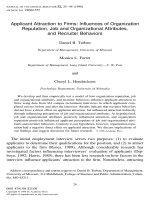Chiến Lược Thảo Luận Nhóm (Tài liệu tiếng anh)
Bạn đang xem bản rút gọn của tài liệu. Xem và tải ngay bản đầy đủ của tài liệu tại đây (433.43 KB, 42 trang )
www.managementstudyguide.com
Group Discussion Strategies
www.managementstudyguide.com
Learning Objectives
1
What is a Group Discussion
2
Importance of Group Discussion
3
Types of Group Discussion
4
Process of Group Discussion
5
Evaluation Criteria of Group Discussion
6
Preparing for Group Discussion
7
Do’s & Don’ts of Group Discussion
8
FAQs on Group Discussion
www.managementstudyguide.com
What is Group Discussion?
It is essentially a verbal
-oriented performance
where participants have to
talk their way out
It is a technique or
a method used for
screening candidates
as well as testing
their potential
What is
Group
Discussion?
It is used as a tool to assess
candidates in a group at one
go in order to select the best
in comparative perspective
It is also called
leaderless discussion as
it aims to find out the
natural leadership level
of candidates
www.managementstudyguide.com
Group Discussion Vs Public Speaking
Group Discussion
• Many-to-many situation
• Not a solo performance
•Apart from individual
views,
views of entire group matter
• All the members of the group
participate & one has to
listen to the views of other
members
Public Speaking
• One-to-many
communication situations
• Solo performances
• Individual views matter
• Speaker can take a
particular position on the
topic and speak accordingly
www.managementstudyguide.com
Learning Objectives
1
What is a Group Discussion
2
Importance of Group Discussion
3
Types of Group Discussion
4
Process of Group Discussion
5
Evaluation Criteria of Group Discussion
6
Preparing for Group Discussion
7
Do’s & Don’ts of Group Discussion
8
FAQs on Group Discussion
www.managementstudyguide.com
Importance of Group Discussion
Recruitment
Group discussion has become an
11 part of recruitment process. It
certain attributes of candidates
otherwise difficult to identify
consuming to assess
inevitable
measures
that are
& time
Admission to B-Schools
Group Discussions are an important part of
2 the short-listing process for admission to BSchools as working with groups is one of the
most important parameter of success as a
manager
A number of people who can
communicate their ideas well
and discuss effectively with
others in a one-on-one
situation become tongue-tied
in a group situation. A Group
Discussion will identify
people who have such group
communication skills and
people who do not possess
such group communication
skills
www.managementstudyguide.com
Importance of Group Discussion
More often than not, it
helps the group reach
a decision and solve a
particular problem
It helps understand a
subject more deeply and
improves ability to think
critically
It improves listening skills
and also gives a chance to
listen other participants’
view points
It helps participants
gain confidence by
being vocal about their
thoughts / opinions
www.managementstudyguide.com
Learning Objectives
1
What is a Group Discussion
2
Importance of Group Discussion
3
Types of Group Discussion
4
Process of Group Discussion
5
Evaluation Criteria of Group Discussion
6
Preparing for Group Discussion
7
Do’s & Don’ts of Group Discussion
8
FAQs on Group Discussion
www.managementstudyguide.com
Types of Group Discussion
1.
Topic Based
2.
Case Studies
3.
Group Tasks
www.managementstudyguide.com
Types of Group Discussion
Topic Based
Case Studies
Group Tasks
• Based on specific topics
• Could be Factual, Controversial, or Abstract topics
• Normally used during recruitment process in organizations
• Tries to simulate a real-life situation with an objective to get you
to
think about the situation from various angles.
• Information about the situation is given and participants are
asked
as a group to resolve the situation. There are no incorrect
answers / perfect solutions.
• This type of GDs are normally used by management institutes
• These are an extension of case studies where specific
objectives
are to be achieved as a group.
www.managementstudyguide.com
Types of Group Discussion
Topic Based
Group
Discussions
Factual
Topics
Controversial
Topics
Abstract
Topics
www.managementstudyguide.com
Types of Group Discussion
•
•
Factual Topics
Controversial
Topics
Abstract Topics
Are about practical things, which an ordinary person is aware of.
Typically these are socio-economic topics which may have been in the
news
lately, or could be unbound by time.
• Gives a candidate a chance to prove that he is aware of his environment.
• E.g. The Education Policy of India, Tourism in India, LokPal Bill
•
•
•
•
•
•
•
•
Are argumentative in nature and are meant to generate controversy.
Noise level is usually high, there may be tempers flying.
Objective is to see how much maturity the candidate displays by
keeping his temper in check, by rationally and logically arguing his point
of
view without getting personal and emotional.
E.g. Reservations should be removed, Women make better managers
Are about intangible things.
Usually not given often for discussion, but their possibility cannot be ruled
out.
Objective is to test your lateral thinking and creativity.
E.g. A is an alphabet, Twinkle twinkle little star, The number 10
www.managementstudyguide.com
Learning Objectives
1
What is a Group Discussion
2
Importance of Group Discussion
3
Types of Group Discussion
4
Process of Group Discussion
5
Evaluation Criteria of Group Discussion
6
Preparing for Group Discussion
7
Do’s & Don’ts of Group Discussion
8
FAQs on Group Discussion
www.managementstudyguide.com
Process of Group Discussion
1
8-10 students are
taken as a group,
though in some
cases, up to 16
people may be
included in a
group. The GD
lasts for 10-15
minutes
2
For a topic-based
GD, 2-3 minutes of
thinking time may
be given; though
the group is often
told to start right
away. For case
studies, however,
about 15 minutes
is given
3
Evaluation is done
by experts,
usually professors
from B-School.
These people are
experts and
observe all
details, even if the
GD is chaotic
4
Candidates may
be seated in a
circle or in a
rectangular
arrangement,
with/out a table.
Seating
arrangements
may be prefixed
5
Discussion may be
stopped at the set
time / even earlier.
Conclusion may
be asked for. A
written / oral
summary may be
asked for at the
end from each
candidate
www.managementstudyguide.com
Learning Objectives
1
What is a Group Discussion
2
Importance of Group Discussion
3
Types of Group Discussion
4
Process of Group Discussion
5
Evaluation Criteria of Group Discussion
6
Preparing for Group Discussion
7
Do’s & Don’ts of Group Discussion
8
FAQs on Group Discussion
www.managementstudyguide.com
Evaluation Criteria for Group Discussion
Knowledge
It includes ability
to convince other
participants
without being
aggressive
Creativity
Persuasion
Skills
It includes
thinking out of
the box
Personality
Communication
Skills
It includes smartness,
cheerfulness, enthusiasm,
attitude, and confidence
Analytical Skills
It includes thinking
logically and rationally
It includes
interpersonal skills,
body language,
aggressive / assertive
communication
It includes
subject matter,
relevance, and
depth
Leadership
It includes giving
direction to the group in
terms of content
www.managementstudyguide.com
Evaluation Criteria for Group Discussion
Content
Combination of knowledge & ability to create
logical arguments on the basis of that
knowledge
Communication Skills
Besides listening, evaluators observe your
ability to express ideas clearly & concisely, build
on others' points, sum up the discussion made
by the entire group
Group Dynamics
The evaluators observe participants'
willingness to listen & discuss various points,
ability to appreciate good points made by
others, ability to disagree politely &
summarize
Leadership
Evaluators evaluate on basis of who initiates the
discussion, allows others to express their views
& channels discussion to a probable decision
Content
Communication
Skills
Leadership
Group Dynamics
www.managementstudyguide.com
Learning Objectives
1
What is a Group Discussion
2
Importance of Group Discussion
3
Types of Group Discussion
4
Process of Group Discussion
5
Evaluation Criteria of Group Discussion
6
Preparing for Group Discussion
7
Do’s & Don’ts of Group Discussion
8
FAQs on Group Discussion
www.managementstudyguide.com
Preparing For Group Discussion
Have you heard yourself saying this post participating in a Group Discussion?
“I couldn’t finish”.
“I couldn’t start”.
Nobody let me speak”.
“I didn’t understand the topic”.
“Someone got sarcastic”.
“Someone else dominated the GD”.
Here is how you can better prepare for Group Discussions…
www.managementstudyguide.com
Preparing For Group Discussion
1. Content
• Develop subject knowledge on
current affairs, general awareness
& business trends.
• Structure arguments [for & against]
on selected topics, considering both
sides to the argument.
• Plan for short and
3 crisp points.
2
1
www.managementstudyguide.com
Preparing For Group Discussion
Display Behavioral Traits
• Leadership trait by showing direction to the
group whenever group moves away from the
topic, coordinate the effort of participants.
• Assertiveness is displayed when you put
your
point to group in a very positive & confident
manner.
• Listening skills can be displayed by striking a
proper balance between expressing your ideas
& imbibing suggestons.
• Creativity is reflected when you put across
new idea, such that
3 it is discussed at length by
the group.
2
1
www.managementstudyguide.com
Preparing For Group Discussion
Practice
• GD skills cannot be learned from books.
• Get into practice groups.
• Get skilled people to observe and give
feedback.
• Spend a lot of time analysing each GD
performance. Plan specific improvements
3
2
1
www.managementstudyguide.com
Preparing For Group Discussion
We hear discussions in the college canteen, in the train, at the bus
stop, during a meeting or anywhere where people come together.
Before starting a Group Discussion let’s remember to ask ourselves:
Can we disagree without being disagreeable?
Can we be analytical without being critical?
Can we be assertive without being aggressive?
Can we listen and not just speak?
www.managementstudyguide.com
Learning Objectives
1
What is a Group Discussion
2
Importance of Group Discussion
3
Types of Group Discussion
4
Process of Group Discussion
5
Evaluation Criteria of Group Discussion
6
Preparing for Group Discussion
7
Do’s & Don’ts of Group Discussion
8
FAQs on Group Discussion
www.managementstudyguide.com
Do’s & Don’ts of Group Discussion
Do’s
Don’ts
х Don't take offence if a person disagrees with
Respect the contribution of other speakers.
Speak pleasantly.
you.
х
Listen well to the ideas of other speakers;
Don't ridicule the contribution of others by
you will learn something.
using
Learn to disagree politely.
comments like `that's stupid', that's ridiculous,
Respect that others have differing views.
or `you're wrong'.
Think about your contribution before you speak. х Don't try to intimidate another speaker.
х Don't use a loud or angry tone. Others will not
Try to stick to the discussion topic.
Your body language should be `open' & friendly.
want to listen to you if you are being
Agree & acknowledge anything interesting.
aggressive.
х Don't use aggressive gestures like finger Stay with the topic. If the discussion does
waiver, bring it back on topic by saying `that's
pointing
an interesting point, can we come back to that
and table-thumping.
х
later?
Try not to dominate the discussion. Confident
Try to speak clearly. Don't whisper.
speakers should allow others a chance to
speak.
х Avoid drawing too much on personal
experience.
х Don't interrupt or talk over another speaker.
Listening to others earns you the right to be
heard.









